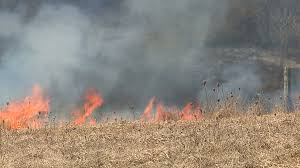Shahjahanpur, Oct 16: Hours after a mechanised harvester chugged through the rice paddy, flames and a thick plume of black smoke rose into the twilight sky in Haryana as farmers burned the residue to prepare for the next season’s planting.
Similar fires seen last week in Haryana and neighbouring Punjab suggest that efforts by authorities to stave off a massive spike in pollution in nearby New Delhi in the next few weeks may fail.
Late last year, Delhi and a large part of northern India were covered in dangerous toxic smog that forced authorities to shut schools, ban diesel-run generators, construction, burning of garbage and non-essential truck deliveries.
The World Health Organisation said earlier this year India was home to the world’s 14 most polluted cities, with Delhi ranked the sixth most polluted.
As pollution levels climbed to 12 times the recommended limit and the Indian Medical Association declared a public health emergency in the capital last year, Delhi Chief Minister Arvind Kejriwal called the city a “gas chamber.” Friday, he warned the city may face the same fate this year because of the unrestrained stubble burning.
A spokesman of the federal environment ministry declined to comment. A spokesman for the Haryana government was not available for comment.
Gurkirat Kirpal Singh, a spokesman for the Punjab government, said the state administration had formed a committee of senior officials which was working to ensure that incidents of stubble burning drastically come down this year. He did not elaborate.
An official at the Prime Minister’s Office, which is coordinating efforts to bring down pollution in the capital, declined comment.
The smog worsens when the heavy smoke from crop burning combines with vehicle and industrial emissions at a time of year when wind speeds drop significantly. Fireworks set off to celebrate Diwali, that fell October 19 last year and will be November 7 this year, exacerbated the problem.
After last year’s crisis, the Indian government introduced some measures aimed at curbing the crop fires, in particular offering to pay up to 80 per cent of certain farm equipment, such as a Straw Management System (SMS) that attaches to a harvester and shreds the residue.
The plan was for the shredded material to be mulched using another machine and irrigated at least twice to get it to decompose. All this would be done without any crops being burned.
The only problem is that 14 farmers Reuters spoke to on a visit last week to six villages in the rice and wheat growing areas of Haryana and Punjab, said the plan wasn’t working.
Reuters






































